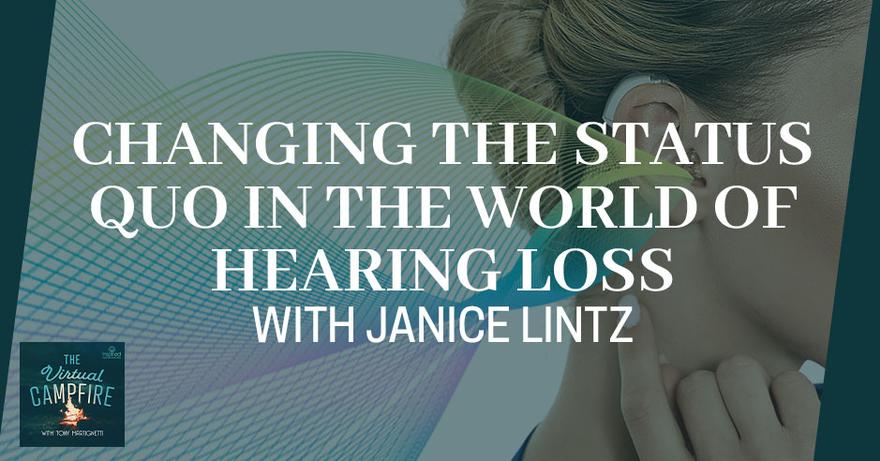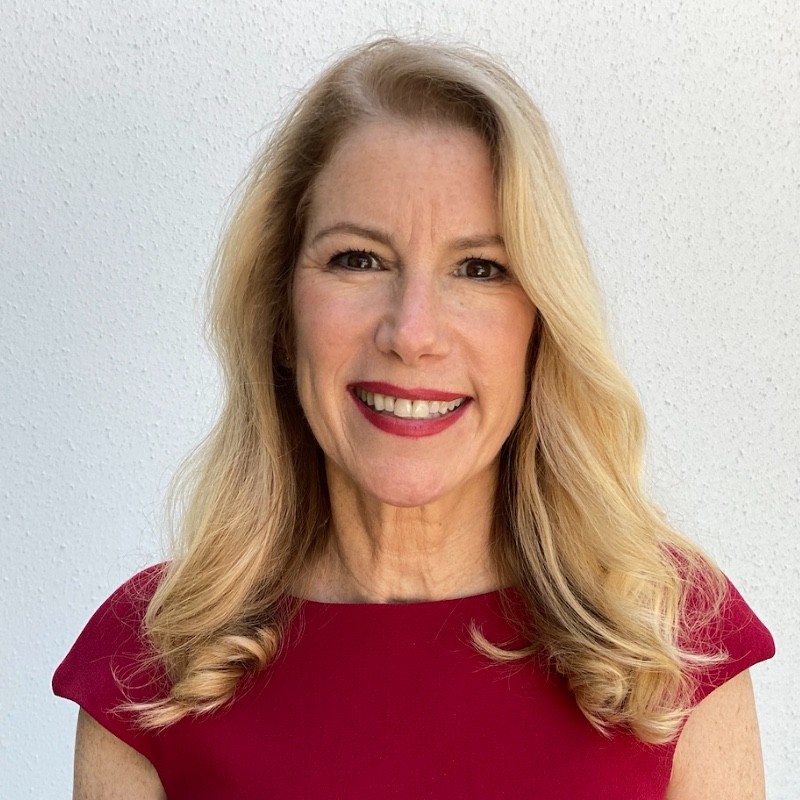Changing The Status Quo In The World Of Hearing Loss With Janice Lintz

Hearing loss is a major problem that affects millions of people around the world. Despite this, the conversation around hearing loss is often relegated to the sidelines. That's what challenges Janice Lintz, a passionate and accomplished hearing loss consultant and advocate. Janice is well known and respected for her ability to assess situations, identify areas for improvement, recommend solutions, and implement programs that help organizations improve customer service and grow profits. Her ability to break down issues and do what is needed to affect change has earned her unprecedented access to business leaders, government officials, political leaders, and respected academians worldwide. Today, Janice shares her advocacy and explores ways we can change the status quo regarding hearing loss.
---
Listen to the podcast here
Changing The Status Quo In The World Of Hearing Loss With Janice Lintz
It is my honor to introduce you to my guest, Janice Lintz. She is an accomplished consultant and an advocate across the hearing access advocacy and related political spectrum. She's the CEO of Hearing Access & Innovations. It is the leading company dedicated to helping the world's businesses, cultural and entertainment institutions, government agencies and mass transit organizations improve their accessibility for people with hearing loss.
The proposed over-the-counter hearing aid regulations cite her FDA testimony in their footnotes. She has traveled to 199 countries, territories and unrecognized nations so far and I'm sure she still has her sight set on more countries. We'll hear more about that as we uncover her story. I'm thrilled to welcome you to the show, Janice.
Thank you so much, Tony, for having me. I'm looking forward to speaking.
As we do on the show, we uncover your story through what's called flashpoints. These are points in your journey that ignited gifts into the world. People don't just show up and make an impact. There's a journey that uncovers who they are. As you're telling your stories, we'll pause along the way and see what themes are showing up. With that, Janice, I'm going to turn it over to you and allow you to start wherever you're called to start and share what you're called to share. Take it away.
I started the journey because my daughter was diagnosed with hearing loss. When the doctor diagnosed her, right after the diagnosis, she said there were special schools for her. Her idea of special and my idea of special were two different specials. My daughter is in her second Ivy League school for a graduate program. I decided it was easier to change the world and my standards. That's what I decided to do. It was a selfish endeavor. It wasn't meant to be this martyr. We needed our family to function. We couldn't because of these artificial barriers put into place by people who were unaware of what was needed. They didn't care. My goal was to educate and make them care.
It's these simple actions that start to move you forward. I love that. That's what caused you to move into this world. I want to rewind a little bit. I love that you started with this but I'd like to understand more about who you were as a young adult. What schooling did you have before you got into this endeavor?
My undergraduate degree is in Business Marketing and I went to law school. I'm trained as a lawyer but I barely practiced. While all of that, in some way, every part of your journey helps you move forward and place sometimes you can't anticipate that they will come together. There was a point where I never thought my Law degree and my Marketing degree would come together, and they did on many points.
I find in life that it's standing up top position and taking the initiative. Most people see issues. They don't think they can change it. They're too exhausted or indifferent. That's not the way I am. I don't settle for the status quo.
We have the preconceived notions that people with hearing loss are stupid. If they can't hear the question and respond differently, they must be stupid, but no. They just didn't hear the question.
This is a classic flashpoint. Once it becomes personal or something that is connected to who you are as an individual, that's when the fire starts for you. You could say that the background, all the teachings that you went through before getting into this fight, are preparing you for this game. Lawyer and marketer, all those things are great practice but ultimately, you need to have that heart get into the game to ignite you into this path.
That is the secret sauce of why I succeeded where others may have not. It's also because it wasn't about me. It was about my daughter. There is a big difference when you're advocating for yourself versus for someone else. When it's about yourself, people could seem to dismiss you because I've advocated for myself for other issues and a different reaction. When you advocate for your daughter, it's different and I find that frustrating because I've been on the receiving end when I'm advocating for myself and I'm not getting the same reaction. I'm like, “Why? That doesn't make sense.” The heart is what kept me in the game because others may have given up on projects.
You think that at some point, you'd have some fatigue. You'd be burnt out but it keeps you going.
I did make no mistake. There is burnout but I learned how to manage the burnout. The key with anything you do is you have to manage the burnout. You have to find ways to deal with burnout, but there is absolute burnout.
I want to uncover some more flashpoints but before I do that, I do have another question about this. Was this a solo effort or did you enlist people along your journey to make the load a little bit less heavy?
There is a giant team of people. Sometimes people think it's me and it's a one-woman martyr project. It's not. First of all, you could not accomplish what I have accomplished as one person because I do speak and I like to speak. In some companies or organizations, some people were willing to speak. They needed me to be the speaking piece and speak out. They could make it happen internally if I was the one that spoke out about it.
I learned to build teams within the organizations I was working with. People never knew who I was working with. Although after they die, I do disclose because sometimes things come out and I'm like, “The person is already deceased.” It made a big difference having these people on the inside or in different organizations who helped me on the side but maybe their companies didn't allow them to speak out, be as vocal or visible. People will help when they know you're not wasting their time and there's going to be a success in the end.
I love that you share that because there's something about that, which is to say that nothing powerful happens by a solo person working alone. It is enlisting of a myriad of people to support you in the path.
The thing was I did things differently. I didn't start the nonprofit because I didn't want to deal with a board of directors who were maybe afraid to dip their toes because of their careers. I knew the things we needed to do. We're going to be remarkably different from what others have done. By keeping everything a little opaque, nobody knew who I was working with and where the people were coming from but it was obvious. Nobody could work across many industries and countries as a solo person.
I felt the models of no profits don't always work in some industries. You see this very much in the hearing loss world, where the hearing aid companies dominate some of the nonprofits because they purchase advertising when making donations and they control the organization. I didn't want to spend my entire life fundraising. I wanted to have success. If you're in a nonprofit, you have to fundraise a large part of your time. I didn't want to do that. Being “no profit” and having people help me disrupted the way things were done and that confused people. People don't like when they're confused.
I want to come back to something important about this particular issue, which is resistance. I can imagine how much resistance you've hit against. I want you to share some of what your stories of resistance have been along your journey to drive this change so far, especially given the fact that there are some preconceived notions people have around hearing loss.
You have the preconceived notions that people with hearing loss are stupid. The Patty Duke Show of Helen Keller drove that with her arms flailing and that's the perception of who people are. They're stupid. Think about this. If you can hear the question and you respond differently, you must be stupid but no, you didn't hear the question.
There's this perception that all people with disabilities are feeble people because that's how the media has crafted people with disabilities. They call them disabled. They don't use person-first terminology. They show them and it doesn't help. Even after getting the Americans with Disabilities Act, people had to crawl up the Capitol Steps and create a moment. That makes them look even more feeble. It shouldn't take that change. The issue becomes that access requires spending money.
I'm dealing with a museum in Texas, the Campbell Museum, where they've been dragging their feet for years. I’m like, “Why are you dragging your feet? This is common sense. It's another museum. It's unacceptable.” They always have priorities. You have COVID, and museums have been shut, but there's always an excuse. I always say, “Disability access is another line item in the budget. How do you figure out how to turn on your air conditioning or electricity?” It's that need to spend money that has prevented access.
I want to get back into your story and ask. What were the other moments? If we were to think about your journey, you were ignited into this path of getting into space. Tell me more about some of the moments along the way that have changed you and shaped who you are.
I realized that it didn't happen immediately. After her diagnosis, I had to get her settled. Fast-forward, she was going to religious school. She said she couldn't go to religious school because she couldn't hear. I said, “Nice try because you have been trying to get out of religious school since religions started across all religions. Let me go talk to the head of the school.” I did. He immediately added the access she needed. I felt that it wasn't that complicated. Maybe I could try with other places. I did. Sometimes it wasn’t an education issue. They didn't know what to do. No one had explained because the ADA is unclear and that's part of the problem.
The secret to not burning out is to be efficient and smart in approaching projects.
Whoever wrote it tried to make it broad to have technology change. Old technology doesn't change quite that fast. The overbroad newness or vagueness of it means that people will avoid access, which is ridiculous. That was a turning point because I realized my job is to educate people on what my daughter needed.
It’s finding the people who are able to drive that needle. If you continue to hit the wrong spots, you're going to continue to run and burn yourself out
Part of the other secret of not burning out is by being efficient and smart in how you approach projects because people will try to spin your wheels to make you go away. There's a certain point where you recognize that and you have to stop it because they will wear you out to make you go away.
In some ways, that's their method to see if they can get you to be exhausted and go away. Make sure that this spending might cost to put in these additional requirements will not end up having them impact them. Instead, “If we give her some time, she'll go away.” “Nope. I'm not going anywhere.”
When people think that I'm going to go away and I feel this is happening, I tell them, “I never go away and you should know that.” I make that clear. That was the advantage because I was not able to go away. As long as I spoke the truth, there was nothing they could do. They didn't know what to do with me. Eventually, they capitulated.
What you've shared so far is digging deeper into the story of what brought you to do the work and the different parts of the journey, which don't end up here. You had to continue to chip away and find different ways of making an impact. As you think about where you are and the next part of the journey, what are some things that are on the horizon you feel you need to dig deeper into? What do you think is going to be the next part of the journey for you?
My goal is to take this much more global. I've been working globally. My goal is to make it even more global. I returned to school at the Harvard Kennedy School. My goal is to learn new tools to figure out how to take the next step and where to go next. The important part is to keep building your toolbox of resources. Not only do you keep reaching out to new people but taking classes, expanding how you approach things and refining and getting better. That has helped me in the past. I felt like I was at another turning point where I needed to see, “What else can I learn to do this better?”
If you come to this place, you've exhausted all your resources and you say, “What do I do?” You continue to be a beginner and see what else is possible. The reality is at the core of all of this, you're driven by your heart to get you to where you want to go, which is to say, “This can't stand in the world. We can't stand for not having these things.”
If this was a nice way to use your time, that would be you at some point to say, “Maybe I'll do something different.” The reality is this is ingrained in who you are. No matter what, your purpose is pulling you in the direction of making this happen. There are going to be different ways for you to make that happen but ultimately, the cause that you're after is still at the core of what you do. That's why when you go into people's offices, you tell them you're not going to give up because it's at the core of you.
I never give up and go away. They think I may. What I find is sometimes you need time so other people can see what's going on. You may know what's going on but people may not believe you. Over time, they see the pattern and the behavior becomes more obvious.
Never go away. When they know that and you develop that reputation, it helps you.
I sent Secretary Norton a seventeen-page, full log of everything I had done, every person I met, every meeting and every request because people were spinning my wheels to add access at Ellis Island. That's powerful when you send a seventeen phone log with everybody's name details and a summary of the conversation. When people know you're keeping track, they stop wasting your time, which is not appropriate, to begin with. No one should waste somebody's time like that.
Tenacity is the word that comes to mind that describes you. A lot of us could use a lot more tenacity. Being an entrepreneur myself, and I talked to a lot of entrepreneurs, we collect noes. At some point, you're like, “Do I stop collecting noes?” The reality is at some point, the yes starts arriving but you have to stay in the game to start getting those yeses. You have to be tenacious. One thing that's great about you is a quality that is a true gift.
It happens to be my thing but I love what I do and that's part of it. I found my passion.The secret to not burning out is to be efficient and smart in approaching projects.
We're coming to this place where I want to reflect on what are the things you've learned about yourself on your whole life journey that you want to share with others and lessons learned about the qualities of who you are?
When I started this journey, I was a mom. It's funny, I'm going back to school and the people in my class are this phenomenal group of people, ministers from all over the world and there's me, a mom, who's affected this global change but I didn't start like that. I've learned if you put one foot forward and keep walking through doors, things happen. This sounds so super trite but if you put good out in the world, that comes back to you.
You learn from people, and it's about surrounding yourself with the people who are smarter and better than you because it challenges you
I've learned to keep putting myself out there and keep challenging myself. The greatest thing is that it turns out I'm able to not only disrupt industries but disrupt myself. I didn't know that about myself. For everybody, if you think you can't do it, start small and baby steps. Take a little change and do a little more.
Coming from you means a lot because it's powerful what you've been able to accomplish. Here you are going back to school. It's wild. This is an incredible opportunity to learn not only from school but from my incredible cohort of classmates that are rock stars. I'm so impressed. I can't even believe it. I'm learning so much from them already. This is going to advance my access but it's constantly challenging me to say, “I can do it.” Plus, it impacts you in ways. There are little ways you can do that.
One of the things that we didn't talk about at all but is also important is you've been to 199 countries. That's not something that you take lightly. That takes a lot of guts. A lot of learning comes out of going and traveling to those countries.
It's building this incredible team of people. Sometimes I travel with groups and they're planning it, which is helpful. Sometimes I'm relying on incredible friends in the travel community. I built friends and met people. I learned from them and they learned from me. It's sharing information. I've been lucky to have these great people who have helped me because there are people who are much more troubled than I am. It's about surrounding yourself with people who are smarter and better than you because it challenges you.
I surround myself with people who are smarter than me. I love that. Travel has impacted my work because I've sought global best practices and seen what countries are doing or not doing. I want to understand why.
I'm thrilled to have you on the show. This has been such an incredible conversation. I have the last question. What are 1 or 2 books that had an impact on you and why?
I'm going to do something different because I disrupt industries. I'm going to disrupt the question. I'm not going to recommend books because it's not that I don't read or like books, but I have found greater than books. It is going to lectures. Let me explain why. Even if you hear the person who wrote the book at the lecture, what I like is being able to engage with the writer. If I read the book and I have a question, I can ask my questions and get feedback. I can't get that from a static book. I like the feedback or the diving deeper than the book may have allowed. I recommend going to lectures.
Even if you live in a small place, there's a library, university, college or something with some people coming through. I love going to that and asking questions. It doesn't have to be on your topic. I've gone to lectures about climate change, sex trafficking and things that seem disparate and unrelated to disability but at the root, the way people affect change is the same across the board. Changemakers are present at all different things. Sometimes if I see someone speaking or attending an event, I want to go to that event because I want to have an interaction with them. With that, I’m changing the question and disrupting it.
It's brilliant what you shared, because first of all, there's something about the points that come across with the emotion attached. I love books, don't get me wrong, but when there's an emotion attached to the words through a lecture, it changes the game entirely. There's something about that which makes it so much more powerful. A book, which most authors would agree, is that it's the start of something. It's not meant to be the end of, “I wrote this book. I'm complete.” You're not complete. What you've done is you've started something that you should then continue through dialogue with other people. It should be coupled with a lecture.
I love that, and it's something people don't think about. They also think it has to be on point. Listening to smart people, engaging with them and asking thoughtful questions, not questions to hear yourself speak because nobody wants to hear you ever asked that question, makes a big difference, especially in a small community.
I can't thank you enough for everything you've shared. This has been a joy. Thank you, Janice.
It's my pleasure. I loved the conversation and thank you so much for listening to me.
Before I let you go, I want to make sure people know where they can find out more about you. What's the best place they can reach out if they'd like to?
There are three different places. My advocacy site is JaniceLintz.com. My consulting is HearingAccess.com, and I'm on LinkedIn under Janice Lintz. I look forward to it. Please reach out to me.
Thank you so much. Thank you too, readers, for coming on the journey. I know you're taking away so many great insights. I hope that you're out there becoming part of our cause to create some change in the world.
Important Links
About Janice Lintz
 I'm a Harvard Kennedy School MC-MPA 2023 candidate who is an innovative, driven leader with a strategic mindset who develops, disrupts, and implements creative strategies and solutions that transform organizations to improve human life worldwide. I am best known for my work as CEO of Hearing Access & Innovations, a leading global business dedicated to helping the world's corporations, cultural and entertainment institutions, government agencies, and mass transit organizations improve accessibility for 360+ million people with hearing loss.
I'm a Harvard Kennedy School MC-MPA 2023 candidate who is an innovative, driven leader with a strategic mindset who develops, disrupts, and implements creative strategies and solutions that transform organizations to improve human life worldwide. I am best known for my work as CEO of Hearing Access & Innovations, a leading global business dedicated to helping the world's corporations, cultural and entertainment institutions, government agencies, and mass transit organizations improve accessibility for 360+ million people with hearing loss.


0 comments
Leave a comment
Please log in or register to post a comment